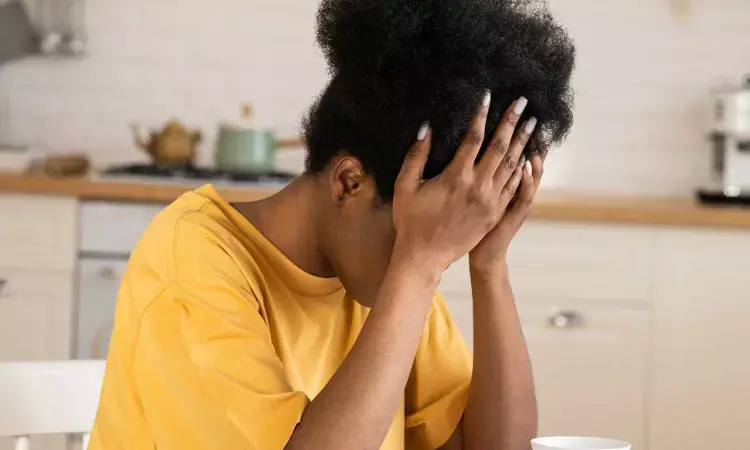- Home
- Medical news & Guidelines
- Anesthesiology
- Cardiology and CTVS
- Critical Care
- Dentistry
- Dermatology
- Diabetes and Endocrinology
- ENT
- Gastroenterology
- Medicine
- Nephrology
- Neurology
- Obstretics-Gynaecology
- Oncology
- Ophthalmology
- Orthopaedics
- Pediatrics-Neonatology
- Psychiatry
- Pulmonology
- Radiology
- Surgery
- Urology
- Laboratory Medicine
- Diet
- Nursing
- Paramedical
- Physiotherapy
- Health news
- Fact Check
- Bone Health Fact Check
- Brain Health Fact Check
- Cancer Related Fact Check
- Child Care Fact Check
- Dental and oral health fact check
- Diabetes and metabolic health fact check
- Diet and Nutrition Fact Check
- Eye and ENT Care Fact Check
- Fitness fact check
- Gut health fact check
- Heart health fact check
- Kidney health fact check
- Medical education fact check
- Men's health fact check
- Respiratory fact check
- Skin and hair care fact check
- Vaccine and Immunization fact check
- Women's health fact check
- AYUSH
- State News
- Andaman and Nicobar Islands
- Andhra Pradesh
- Arunachal Pradesh
- Assam
- Bihar
- Chandigarh
- Chattisgarh
- Dadra and Nagar Haveli
- Daman and Diu
- Delhi
- Goa
- Gujarat
- Haryana
- Himachal Pradesh
- Jammu & Kashmir
- Jharkhand
- Karnataka
- Kerala
- Ladakh
- Lakshadweep
- Madhya Pradesh
- Maharashtra
- Manipur
- Meghalaya
- Mizoram
- Nagaland
- Odisha
- Puducherry
- Punjab
- Rajasthan
- Sikkim
- Tamil Nadu
- Telangana
- Tripura
- Uttar Pradesh
- Uttrakhand
- West Bengal
- Medical Education
- Industry
Psilocybin significantly reduces major depressive disorder symptoms: Lancet

A new study by Robin von Rotz and team shows that for at least two weeks, a single modest dose of psilocybin dramatically lowers depressed symptoms. The findings of this study were published in eClinical medicine.
Psilocybin has been proposed as a unique, fast-acting depression therapy. Two consecutive doses have been proven to considerably lessen symptom severity in an open-label scenario or when compared to a waiting list group. To the best of the researchers' knowledge, no other trial has compared a single moderate dose of psilocybin to a placebo condition; thus, the primary goal of this randomized clinical trial was to investigate the effect of a single moderate dose of psilocybin versus placebo (equal time spent with psychological support in both treatment conditions) in patients with major depressive disorder (MDD).
In this double-blind, randomized clinical experiment, 52 people with major depressive illness and no unstable somatic problems were randomly assigned to receive either a single, moderate dosage (0.215 mg/kg body weight) of psilocybin or placebo, along with psychological support. MADRS and BDI scores were used to quantify depression severity, with primary outcomes defined as changes from baseline to 14 days following the intervention. The experiment was held in the psychiatric university hospital in Zürich, Switzerland, between April 11th, 2019 and October 12th, 2021.
The key findings of this study were
The psilocybin condition had an absolute reduction in symptom severity of 13.0 points compared to baseline, which was significantly greater than the placebo condition (95% CI; 15.0 to 1.3; Cohens' d = 0.97; P = 0.0011; MADRS) and 13.2 points (95% CI; 13.4 to 1.3; Cohens' d = 0.67; P = 0.019; BDI) 14 days just after intervention.
In the psilocybin condition, 14/26 (54%) subjects satisfied the MADRS remission criteria.
The current findings show that a single, medium dose of psilocybin may be equally effective in lowering depression symptoms as repeated greater doses delivered in prior research, while producing fewer side effects. This conclusion, however, must be verified in future dose-response studies that include long-term follow-up assessments. All individuals tolerated the intervention well. Secondary endpoints indicate widespread improvements in a number of mental disorders. Lastly, greater study into psilocybin's dose-dependent mechanisms of action is required to optimize the psychological treatment paradigm that incorporates psilocybin-assisted therapy.
Reference:
von Rotz, R., Schindowski, E. M., Jungwirth, J., Schuldt, A., Rieser, N. M., Zahoranszky, K., Seifritz, E., Nowak, A., Nowak, P., Jäncke, L., Preller, K. H., & Vollenweider, F. X. (2023). Single-dose psilocybin-assisted therapy in major depressive disorder: a placebo-controlled, double-blind, randomised clinical trial. In eClinicalMedicine (Vol. 56, p. 101809). Elsevier BV. https://doi.org/10.1016/j.eclinm.2022.101809
Neuroscience Masters graduate
Jacinthlyn Sylvia, a Neuroscience Master's graduate from Chennai has worked extensively in deciphering the neurobiology of cognition and motor control in aging. She also has spread-out exposure to Neurosurgery from her Bachelor’s. She is currently involved in active Neuro-Oncology research. She is an upcoming neuroscientist with a fiery passion for writing. Her news cover at Medical Dialogues feature recent discoveries and updates from the healthcare and biomedical research fields. She can be reached at editorial@medicaldialogues.in
Dr Kamal Kant Kohli-MBBS, DTCD- a chest specialist with more than 30 years of practice and a flair for writing clinical articles, Dr Kamal Kant Kohli joined Medical Dialogues as a Chief Editor of Medical News. Besides writing articles, as an editor, he proofreads and verifies all the medical content published on Medical Dialogues including those coming from journals, studies,medical conferences,guidelines etc. Email: drkohli@medicaldialogues.in. Contact no. 011-43720751


